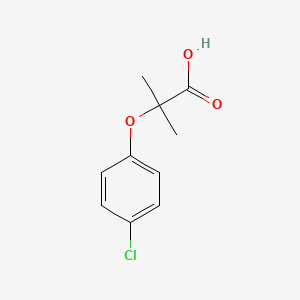m6A-centered Drug Response Information
General Information of the Drug (ID: M6APDG01323)
| Name |
Fibrates
|
||||
|---|---|---|---|---|---|
| Synonyms |
clofibric acid; 882-09-7; 2-(4-Chlorophenoxy)-2-methylpropanoic acid; Chlorofibrinic acid; Clofibrinic acid; Chlorfibrinic acid; Clofibrin; 2-(4-CHLOROPHENOXY)-2-METHYLPROPIONIC ACID; Chlorophibrinic acid; PCIB; Clofibrate free acid; Clofibrinsaeure; Regulipid; Regadrin; PCPIB; 2-(p-Chlorophenoxy)-2-methylpropionic acid; 2-(4-Chlorophenoxy)isobutyric Acid; 4-CPIB; 2-(p-Chlorophenoxy)isobutyric acid; Propanoic acid, 2-(4-chlorophenoxy)-2-methyl-; alpha-(p-Chlorophenoxy)isobutyric acid; Acido clofibrico; Acide clofibrique; Acidum c
Click to Show/Hide
|
||||
| Status |
Investigative
|
||||
| Structure |
 |
||||
| Formula |
C10H11ClO3
|
||||
| InChI |
1S/C10H11ClO3/c1-10(2,9(12)13)14-8-5-3-7(11)4-6-8/h3-6H,1-2H3,(H,12,13)
|
||||
| InChIKey |
TXCGAZHTZHNUAI-UHFFFAOYSA-N
|
||||
| PubChem CID | |||||
| TTD Drug ID | |||||
Target Gene(s) and Their Upstream m6A Regulator, Together with the Effect of Target Gene(s) in Drug Response
The target genes involved in drug-target interaction (such as drug-metabolizing enzymes, drug transporters and therapeutic targets) and drug-mediated cell death signaling (including modulating DNA damage and repair capacity, escaping from drug-induced apoptosis, autophagy, cellular metabolic reprogramming, oncogenic bypass signaling, cell microenvironment, cell stemness, etc.) could be regulated by m6A regulator(s) and affected their corresponding drug response. You can browse detailed information on drug-related target gene(s) mediated by m6A regulators.
Peroxisome proliferator-activated receptor alpha (PPARA)
Fat mass and obesity-associated protein (FTO)
| In total 1 mechanisms lead to this potential drug response | ||||
| Response Summary | Peroxisome proliferator-activated receptor alpha (PPARA) is a therapeutic target for Fibrates. The Fat mass and obesity-associated protein (FTO) has potential in affecting the response of Fibrates through regulating the expression of Peroxisome proliferator-activated receptor alpha (PPARA). | [1], [2] | ||
Methyltransferase-like 14 (METTL14)
| In total 1 mechanisms lead to this potential drug response | ||||
| Response Summary | Peroxisome proliferator-activated receptor alpha (PPARA) is a therapeutic target for Fibrates. The Methyltransferase-like 14 (METTL14) has potential in affecting the response of Fibrates through regulating the expression of Peroxisome proliferator-activated receptor alpha (PPARA). | [2], [3] | ||
Methyltransferase-like 3 (METTL3)
| In total 1 mechanisms lead to this potential drug response | ||||
| Response Summary | Peroxisome proliferator-activated receptor alpha (PPARA) is a therapeutic target for Fibrates. The Methyltransferase-like 3 (METTL3) has potential in affecting the response of Fibrates through regulating the expression of Peroxisome proliferator-activated receptor alpha (PPARA). | [2], [4] | ||
Wilms tumor 1-associating protein (WTAP)
| In total 1 mechanisms lead to this potential drug response | ||||
| Response Summary | Peroxisome proliferator-activated receptor alpha (PPARA) is a therapeutic target for Fibrates. The Wilms tumor 1-associating protein (WTAP) has potential in affecting the response of Fibrates through regulating the expression of Peroxisome proliferator-activated receptor alpha (PPARA). | [2], [3] | ||
YTH domain-containing family protein 2 (YTHDF2)
| In total 1 mechanisms lead to this potential drug response | ||||
| Response Summary | Peroxisome proliferator-activated receptor alpha (PPARA) is a therapeutic target for Fibrates. The YTH domain-containing family protein 2 (YTHDF2) has potential in affecting the response of Fibrates through regulating the expression of Peroxisome proliferator-activated receptor alpha (PPARA). | [2], [4] | ||
References